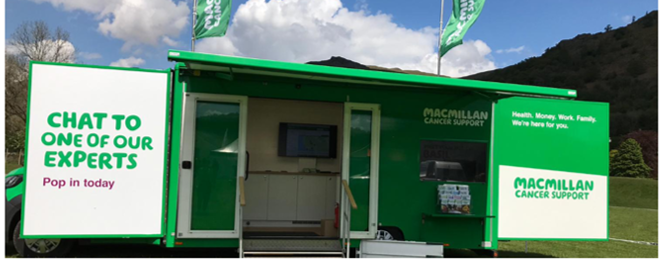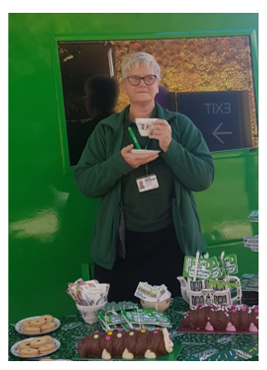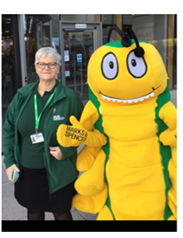
Who’s ever seen Macmillan’s ‘big green buses’ out and about and wondered what it is? Who perhaps wasn’t aware Macmillan had these buses and a Mobile Information Support Service (MISS)? In today’s Community News post, Alison – who works on our ‘Basil’ bus in the North West, tells us about the service, and the people they support.
How the Mobile Information Support Service (MISS) helps people living with cancer…
MISS covers the whole of the UK. Basil covers the North West, Manchester, Lancashire, Cheshire, Merseyside, South Lakes and the Isle of Man. The areas covered have deprivation, are rural communities, ethnic minorities and LGBTQ communities. When deciding where Basil will visit we aim to reach these communities and those that have hard to reach or a lack of local service provision.
"The areas covered have deprivation, are rural communities, ethnic minorities and LGBTQ communities"
We visit a wide variety of sites, in the past year we have been to shopping centres, car boots, steam rallies, the Isle of Man, flower shows and garden centres, an Asian festival, a Caribbean Festival, mosques, a Pride parade, a 20:20 cricket match, and given out sun safety information on a promenade. We also of course had a world’s biggest coffee morning in conjunction with Macmillan’s partner organisation Marks and Spencer’s.
 It was suggested that we wrote this article like ‘a day in the life’, but every day is so different that an overview may be a better way to paint a real picture. We are based in one region for a week at a time. Travelling to Basil in the morning usually for 9am or 10am start, (apart from car boots which start at 6am!) consists of being guided by the Sat Nav until you see the big green bus, banners blowing in the wind announcing our presence. The planned visit will be advertised locally in regional newspapers, local radio stations and the In Your Area section of the Macmillan website. We engage with local businesses, if there is a Boots we invite the No.7 ladies on-board to see what we do, discuss how they are providing the ‘feel more like yourself’ initiative, and show them how to use Macmillan’s online resources so they can pass this on to their clients. We will also leave Signs and symptoms… cards for them to have on their counters. We do local radio interviews to explain why we are there, we have visits from MP’s, the Mayor and other local dignitaries promoting the service we provide.
It was suggested that we wrote this article like ‘a day in the life’, but every day is so different that an overview may be a better way to paint a real picture. We are based in one region for a week at a time. Travelling to Basil in the morning usually for 9am or 10am start, (apart from car boots which start at 6am!) consists of being guided by the Sat Nav until you see the big green bus, banners blowing in the wind announcing our presence. The planned visit will be advertised locally in regional newspapers, local radio stations and the In Your Area section of the Macmillan website. We engage with local businesses, if there is a Boots we invite the No.7 ladies on-board to see what we do, discuss how they are providing the ‘feel more like yourself’ initiative, and show them how to use Macmillan’s online resources so they can pass this on to their clients. We will also leave Signs and symptoms… cards for them to have on their counters. We do local radio interviews to explain why we are there, we have visits from MP’s, the Mayor and other local dignitaries promoting the service we provide.
"On Basil we have people with varied backgrounds, Benefits Advisors, Dieticians, Radiographers and nurses."
The service we provide can be dependent on the location, some will let us hand out information on signs and symptoms, some won’t. Doing this can be a great way to engage with the public and get them talking about their cancer experience, there aren’t many people that have had no experience of the disease. We encourage them to come onboard when we feel there is something we can help them with. On Basil we have people with varied backgrounds, benefits advisors, dieticians, radiographers and nurses. We will work together to support those that ask for help. We help people to access benefits, discuss treatment side effects, give information on specific cancers, bereavement support, help to get local support for carers and anything else that is brought to us. We not only signpost, but also phone services while people are on the bus, and refer patients to the SLS for a call-back if they want this. In each area we invite local cancer service providers to join us as professional volunteers, raising community awareness of what is available, forging vital links and providing local information for our clients.
As well as working on Basil we also provide outreach to places that Basil can’t access. This is where we visit workplaces, community centres, chemotherapy outreach services and more to give talks on signs and symptoms, common cancers, skin safety or whatever is requested. We’ll also man an information table and provide 1:1 support to the public. We have been to the Police Organised Crime Unit, a bakery factory, bank headquarters, a round-table evening, farming events, life after cancer events and more. 
During my time on the bus people have come on and thanked us for getting their benefits, making them feel less isolated, explaining treatment and side effects in a way they understood, listening to them when they felt no one else was, encouraging them to go to the GP as their cancer was then caught early, and for what Macmillan as a whole has done for them or their families.
I have been to places I have never been and seen deprivation, homelessness and people struggling. We have been able to improve things for these people. I have seen sheep on leads, dogs dressed the same as their owners, tractors racing each other to plough a field, had delivery cancelled due to snow, floods, and once because of a shooting overnight near the festival site we were on.
We have been photographed with dignitaries, with life-sized dinosaurs, in the pouring rain, next to someone dressed as a caterpillar cake, on ferries, by lakes, with Star Wars characters, and with donkeys and owls.
No two days are the same and we are helping daily to achieve Macmillan’s aim to reach everyone with a cancer diagnosis.
Macmillan’s MISS team has a fleet of 6 buses, named Basil, Bertie, Beryl, Betty, Bronwen and Dougie. You can find out when the team’s next visiting a place near you on the Macmillan website, here.
Whatever cancer throws your way, we’re right there with you.
We’re here to provide physical, financial and emotional support.
© Macmillan Cancer Support 2026 © Macmillan Cancer Support, registered charity in England and Wales (261017), Scotland (SC039907) and the Isle of Man (604). Also operating in Northern Ireland. A company limited by guarantee, registered in England and Wales company number 2400969. Isle of Man company number 4694F. Registered office: 3rd Floor, Bronze Building, The Forge, 105 Sumner Street, London, SE1 9HZ. VAT no: 668265007